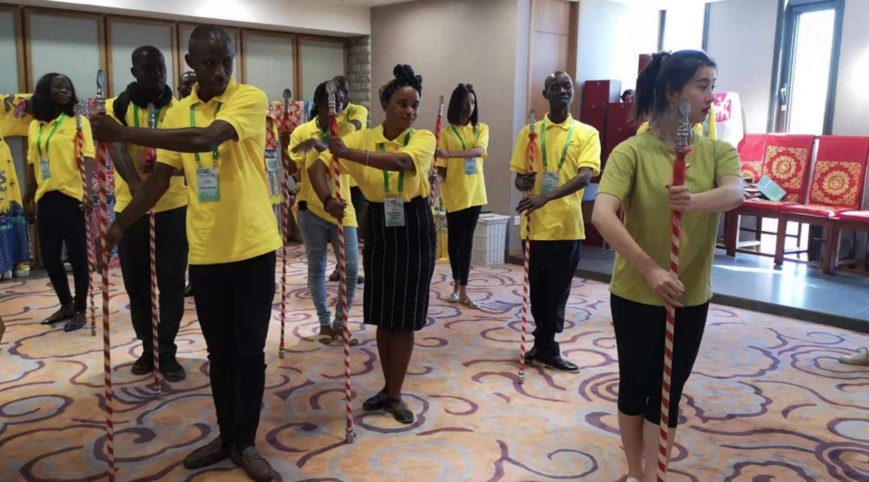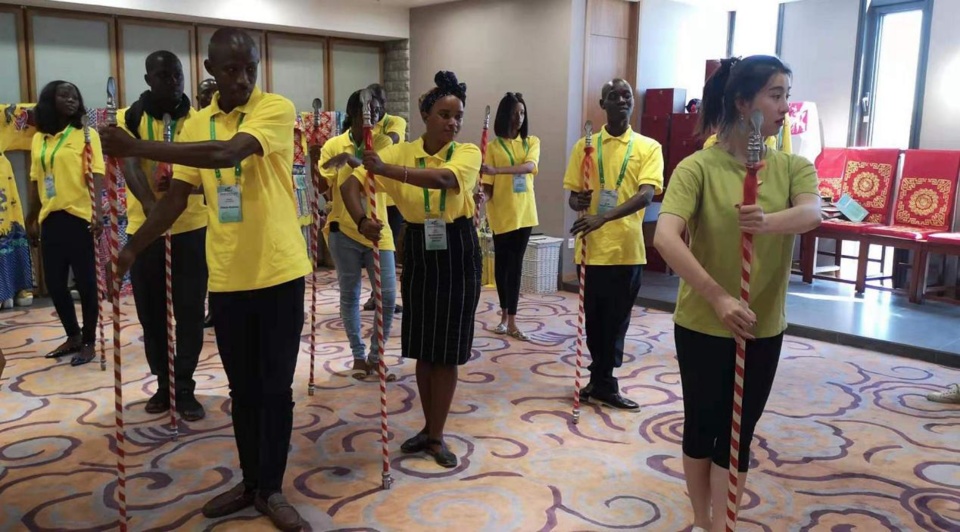By Pan Junqiang, People’s Daily

Representatives of African youths experience Peking Opera performance during the 4th China-Africa Youth Festival, which opened in Beijing on August 28, 2019. (Photo by Li Yan/People’s Daily)
A Beijing-based Peking Opera troupe with a history of more than 80 years has drawn more and more young people to Peking Opera through a series of explorations and innovations while carrying forward the essence of the traditional art form in recent years.
Beijing Fenglei Peking Opera Troupe is located in Banzhang Hutong, an artistic alleyway decorated with painted facial makeup patterns of main Peking Opera roles, relief sculptures of various characters in Peking Opera plays, as well as paintings of costumes and headwear used in the fine performing art in Xicheng district of Beijing.
The time-honored Peking Opera troupe started to think about attracting more young people to their performances after a survey it conducted revealed that young people under the age of 25 accounted for only less than 20 percent of its audience, which was mainly made up of middle-aged and senior people.
“If we can’t get more young people involved, then who are we going to perform for in the future?” The remark of Song Yan, head of the troupe, showed his anxiety over the future of the traditional art.
Beijing Fenglei Peking Opera Troupe then held themed salons and invited young people to share their opinions about Peking Opera. Song was surprised to learn through these salons that many young people did not dislike Peking Opera, but rather didn’t understand or didn’t know how to appreciate the art form.
Song then realized that it is important for young people to learn about the traditional Chinese art so as to better enjoy it.
Considering that Peking Opera has a high appreciation threshold and young people obviously need more opportunities to get to understand and experience the art, Song decided to build a Peking Opera culture and art experience base inside the theater of the troupe.
Visitors to the experience base are allowed to try drawing facial makeup patterns of Peking Opera with their own hands and learn movements and vocal skills of the art form in Peking Opera costumes from professional actors, thus enjoying personally the charm of Peking Opera and acquiring more knowledge about the cultural and artistic value of the performing art.
Beijing Fenglei Peking Opera Troupe has also established ties with some schools, and invited primary and secondary school students to visit the Peking Opera culture and art experience base, aiming to bring the quintessence of Chinese culture closer to children via on-site interpretation and interactive experiences.
Song has also tried to promote Peking Opera by creating modern drama. In January, a play showing the life of an elderly couple who live in a Hutong in the south of Beijing was staged for five consecutive days and enjoyed wide popularity among audiences. Song was the scriptwriter and leading actor of the play.
“Just like establishing the experience base, creating modern drama is also one of our ways to promote Peking Opera,” Song said, explaining that he hopes to demonstrate the beauty of Peking Opera through modern drama, which he considers a more feasible plan to draw Peking Opera outsiders, thus driving the development of Peking Opera.
In recent years, many variety shows, animation and comic works, as well as other forms of artistic works have tried to expand the audience of Peking Opera by spreading the art through ways that are popular among the public and favored by young people.
Popular Chinese television series Winter Begonia, which focuses on the art of Peking Opera and legendary stories of a famous Peking Opera artist and a businessman who is also a big fan of Peking Opera, represents film and television industry’s helpful practice of carrying forward Peking Opera.
Some people who weren’t familiar with Peking Opera have grown fond of the traditional art form after watching modern dramas and film and television works about Peking Opera.
“I thought pop songs are pleasant, and yet never expected that Peking Opera can be so enchanting. Such works help young people discover the charm of Peking Opera and make it possible for Peking Opera to be inherited,” commented an Internet user.
Beijing Fenglei Peking Opera Troupe is located in Banzhang Hutong, an artistic alleyway decorated with painted facial makeup patterns of main Peking Opera roles, relief sculptures of various characters in Peking Opera plays, as well as paintings of costumes and headwear used in the fine performing art in Xicheng district of Beijing.
The time-honored Peking Opera troupe started to think about attracting more young people to their performances after a survey it conducted revealed that young people under the age of 25 accounted for only less than 20 percent of its audience, which was mainly made up of middle-aged and senior people.
“If we can’t get more young people involved, then who are we going to perform for in the future?” The remark of Song Yan, head of the troupe, showed his anxiety over the future of the traditional art.
Beijing Fenglei Peking Opera Troupe then held themed salons and invited young people to share their opinions about Peking Opera. Song was surprised to learn through these salons that many young people did not dislike Peking Opera, but rather didn’t understand or didn’t know how to appreciate the art form.
Song then realized that it is important for young people to learn about the traditional Chinese art so as to better enjoy it.
Considering that Peking Opera has a high appreciation threshold and young people obviously need more opportunities to get to understand and experience the art, Song decided to build a Peking Opera culture and art experience base inside the theater of the troupe.
Visitors to the experience base are allowed to try drawing facial makeup patterns of Peking Opera with their own hands and learn movements and vocal skills of the art form in Peking Opera costumes from professional actors, thus enjoying personally the charm of Peking Opera and acquiring more knowledge about the cultural and artistic value of the performing art.
Beijing Fenglei Peking Opera Troupe has also established ties with some schools, and invited primary and secondary school students to visit the Peking Opera culture and art experience base, aiming to bring the quintessence of Chinese culture closer to children via on-site interpretation and interactive experiences.
Song has also tried to promote Peking Opera by creating modern drama. In January, a play showing the life of an elderly couple who live in a Hutong in the south of Beijing was staged for five consecutive days and enjoyed wide popularity among audiences. Song was the scriptwriter and leading actor of the play.
“Just like establishing the experience base, creating modern drama is also one of our ways to promote Peking Opera,” Song said, explaining that he hopes to demonstrate the beauty of Peking Opera through modern drama, which he considers a more feasible plan to draw Peking Opera outsiders, thus driving the development of Peking Opera.
In recent years, many variety shows, animation and comic works, as well as other forms of artistic works have tried to expand the audience of Peking Opera by spreading the art through ways that are popular among the public and favored by young people.
Popular Chinese television series Winter Begonia, which focuses on the art of Peking Opera and legendary stories of a famous Peking Opera artist and a businessman who is also a big fan of Peking Opera, represents film and television industry’s helpful practice of carrying forward Peking Opera.
Some people who weren’t familiar with Peking Opera have grown fond of the traditional art form after watching modern dramas and film and television works about Peking Opera.
“I thought pop songs are pleasant, and yet never expected that Peking Opera can be so enchanting. Such works help young people discover the charm of Peking Opera and make it possible for Peking Opera to be inherited,” commented an Internet user.
 Menu
Menu
 Troupe attracts more young people to Chinese Peking Opera
Troupe attracts more young people to Chinese Peking Opera
















